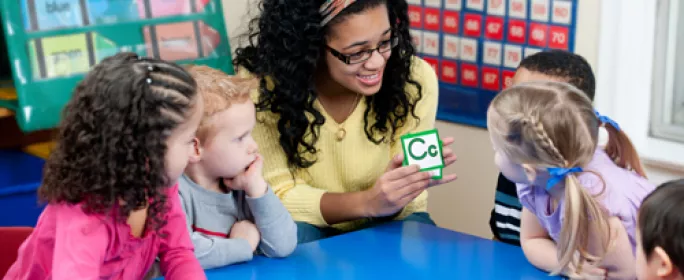Going to nursery linked to better GCSE grades and higher pay
Children who attend pre-school get better GCSE results and earn more money in later life, according to the findings of a major research project published today.
The benefit of going to any type of pre-school, rather than staying at home, was equivalent to getting seven B grades at GCSE, rather than seven C grades, the researchers from the Institute of Education, Birkbeck, University of London, and the University of Oxford found.
The Effective Pre-School, Primary and Secondary Education (EPPSE) research project followed 3,000 children from the age of three to determine the most effective kinds of pre-school education.
Their conclusions also find a link between the amount of time spent in pre-school and later GCSE results. Children who attended for two or three years, whether full-time or part-time, did better in GCSE English and maths at age 16, according to the research.
Kathy Sylva, professor of educational psychology at the University of Oxford, one of the investigators, said: “The EPPSE study is unique because it provides valuable evidence in Europe on the long term value of pre-school - no other research has done this.
“The results are clear - early education pays off, and high quality pre-school education gives children the very best start in life. High quality early education has enduring benefits for the children who experience it and also the society that invests in it.”
Analysis of the EPPSE findings by the Institute for Fiscal Studies shows that children who have attended pre-school will be £27,000 better off over a lifetime.
Sam Gyimah, education and childcare minister, said: “Before they have even worn their school uniform for the first time, a child’s life chances are being decided. Early education not only sets a child off on the right foot at school but, as this extensive research shows, has effects that last right into the workplace.”
The EPPSE project has influenced government policy since it was launched in 1997. Earlier findings revealed that attending a high quality pre-school led to better reading and maths scores at age 11, particularly for disadvantaged pupils. And quality was higher overall where staff were well-qualified, particularly if they were teachers.
Since April 2004, all three and four-year-olds have been entitled to 12.5 hours of early education and this was extended to 15 hours in September 2010.
From 2013, disadvantaged two-year-olds have been entitled to free early education and the government is currently extending this to cover more two-year-olds, but there has been controversy over how this expansion is managed.
Sir Michael Wilshaw, Ofsted chief inspector, has said school-based provision would give disadvantaged children access to high quality practitioners. Other groups, such as the National Day Nurseries Association, say that helping private nurseries hire highly qualified staff would help reduce the ‘quality gap’ in childcare between rich and poor areas.
This latest research has found that the quality of pre-school was still important at age 16, although not as big an influence on results as it had been when children were 11.
Beatrice Merrick, chief executive of Early Education, said: “The latest findings from the EPPSE project confirm that early education is a worthwhile investment for government to make - but it also reminds us that high quality early education has a higher impact than low quality, and for example the impact can be traced right through to later results in maths and English.”
Neil Leitch, chief executive of the Pre-school Learning Alliance, said: “These results clearly demonstrate the value of early years care and education. At a time when childcare policy is largely focused on helping parents return to work, this study is a timely reminder of the significant impact that early years provision has on children’s long-term learning and development.”
Related stories
Private nurseries in poor areas should employ graduates to boost standard 28 May 2014
Teach two-year-olds in schools to improve their education 3 Apr 2014
Pre-school’s ‘protection’ lasts into teen years 10 Feb 2012
Quality nurseries pay long-term dividends 1 Jun 2009
Keep reading for just £1 per month
You've reached your limit of free articles this month. Subscribe for £1 per month for three months and get:
- Unlimited access to all Tes magazine content
- Exclusive subscriber-only stories
- Award-winning email newsletters




